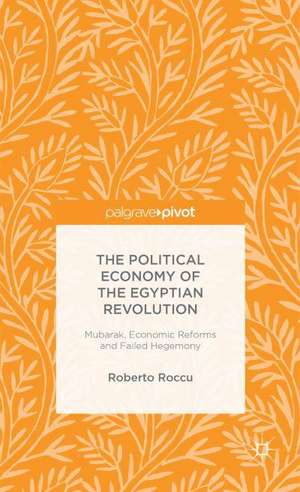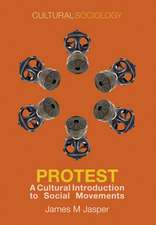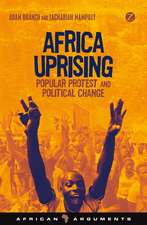The Political Economy of the Egyptian Revolution: Mubarak, Economic Reforms and Failed Hegemony
Autor R. Roccuen Limba Engleză Hardback – 22 noi 2013
Preț: 384.86 lei
Nou
Puncte Express: 577
Preț estimativ în valută:
73.65€ • 76.61$ • 60.80£
73.65€ • 76.61$ • 60.80£
Carte tipărită la comandă
Livrare economică 14-28 aprilie
Preluare comenzi: 021 569.72.76
Specificații
ISBN-13: 9781137395917
ISBN-10: 1137395915
Pagini: 139
Ilustrații: X, 139 p.
Dimensiuni: 140 x 216 x 13 mm
Greutate: 0.34 kg
Ediția:2013
Editura: Palgrave Macmillan UK
Colecția Palgrave Pivot
Locul publicării:London, United Kingdom
ISBN-10: 1137395915
Pagini: 139
Ilustrații: X, 139 p.
Dimensiuni: 140 x 216 x 13 mm
Greutate: 0.34 kg
Ediția:2013
Editura: Palgrave Macmillan UK
Colecția Palgrave Pivot
Locul publicării:London, United Kingdom
Cuprins
Introduction – Bread, dignity, social justice and economic reforms 1. A Gramscian approach to the study of the political economy of reforms 2. The Egyptian way to neoliberalism? IMF, World Bank and reforms in Egypt 3. Of success and greed: the new business class turns into capitalist oligarchy 4. Ideology resurgent? Neoliberalism as economic-corporate project for the few 5. From hubris to debris: global crisis and the end of the Mubarak regime Conclusion: Gramsci, failed hegemony and the fall of Mubarak Postscript: Back to square one? Considerations on Egypt's uncertain future
Recenzii
"By looking at Gramsci through a sophisticated and less usual political economy lens, Roccu has written a brilliant and convincing reconstruction of the short-lived honeymoon between Egyptian elites and neoliberalism in the 2000s. This book offers a fresh perspective from which to understand some of the reasons behind Mubarak's fall in 2011 as well as some suggestions for reading the most recent events in Egypt." - Gennaro Gervasio, British University in Egypt
"This is a fluently written and convincing account of the ways in which neoliberalism plays itself out through the structures of the Egyptian state. Dr Roccu's confident and authoritative use of a Gramscian perspective to examine and explain the unraveling of Mubarak's political hegemony casts new light on the causes of the uprising of 2011. At the same time, it serves as a reminder of the lasting importance of Gramsci's thought. This is all the more necessary as the turmoil and violence of Egyptian politics continue to illuminate the troubled conditions of decayed hegemony." - Charles Tripp, SOAS, University of London, UK
"This is a fluently written and convincing account of the ways in which neoliberalism plays itself out through the structures of the Egyptian state. Dr Roccu's confident and authoritative use of a Gramscian perspective to examine and explain the unraveling of Mubarak's political hegemony casts new light on the causes of the uprising of 2011. At the same time, it serves as a reminder of the lasting importance of Gramsci's thought. This is all the more necessary as the turmoil and violence of Egyptian politics continue to illuminate the troubled conditions of decayed hegemony." - Charles Tripp, SOAS, University of London, UK
Notă biografică
Roberto Roccu is Lecturer in International Political Economy at King's College London, UK. His research focuses on the political economy of reforms in the Middle East, and on how these reforms might have unintentionally contributed to the wave of popular uprisings in the region.















